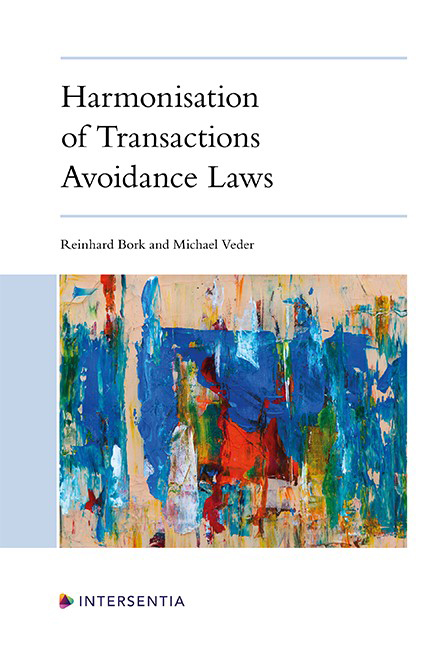Spain
Published online by Cambridge University Press: 26 May 2022
Summary
PART 1. DETAILS OF YOUR NATIONAL TRANSACTIONS AVOIDANCE LAW
I. SYSTEM
Question 1. Is your transactions avoidance law (for terminology cf. Introduction at C.) part of insolvency law or is it in parts or as a whole incorporated in other fields of law (e.g. general civil law, commercial law, company law)?
There are special rules on transactions avoidance in our Insolvency Act (IA) (recast) (Art. 226 – 238 IA), and a general rule in the Civil Code (actio pauliana, Art. 1111 and 1291 et seq.).
Question 2. Are the rules on transactions avoidance law in your jurisdiction the same for entrepreneurs/legal entities and consumers/natural persons? If not, please explain the differences and take it into account when completing this questionnaire.
Yes, they apply to all debtors.
Question 3. Are the rules on transactions avoidance law in your jurisdiction the same for liquidation and restructuring proceedings (if any)? If not, please explain the differences and take it into account when completing this questionnaire.
Yes, there is a set of rules applicable to insolvency proceedings, either liquidation or restructuring. However, they do not apply to preventive restructuring frameworks (Debtor in Possession proceedings (DIP)), i.e. they only apply in restructuring within a formal insolvency proceeding (see Question 4).
Question 4. Are the rules on transactions avoidance law in your jurisdiction the same for debtor-in-possession proceedings (if any)? If not, please explain the differences and take it into account when completing this questionnaire.
Under Spanish law, there are two different situations:
1. preventive restructuring proceedings, which are purely DIP proceedings, and where no transactions avoidance rules apply apart from the actio pauliana;
2. restructuring proceedings, within formal fully fledged insolvency proceedings, where the debtor may also remain in possession but under the supervision of an Insolvency Practitioner. In this second case, the insolvency transactions avoidance rules apply.
Question 5. Does your transactions avoidance law distinguish various avoidance grounds (e.g. preferences, transactions at an undervalue, etc.) or is there only one general clause for all kinds of transactions?
There is a general clause, which covers all transactions: “all transactions detrimental to the insolvency estate performed by the debtor within the two years prior to the opening of the insolvency proceedings may be set aside, irrespective of whether there was a fraudulent intention or not”; and a list of presumptions (iuris tamtum and iuris et de iure, see answer to Question 6 below).
- Type
- Chapter
- Information
- Harmonisation of Transactions Avoidance Laws , pp. 1231 - 1256Publisher: IntersentiaPrint publication year: 2022

